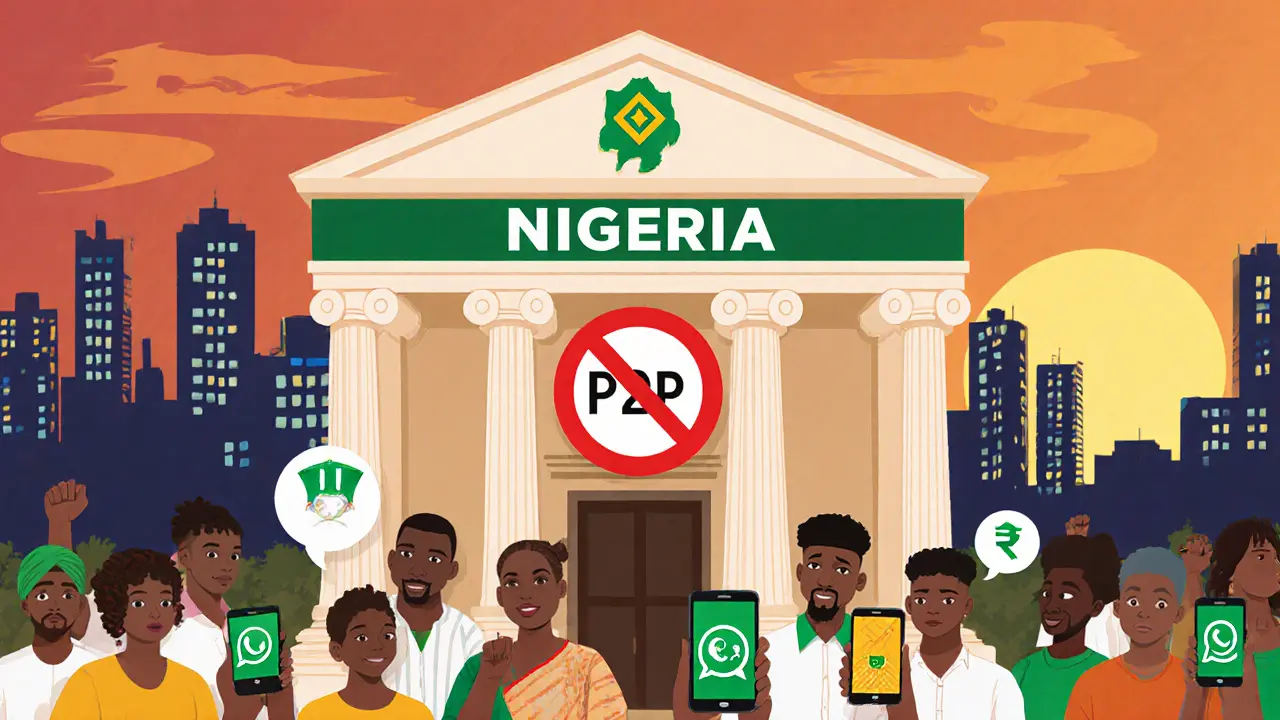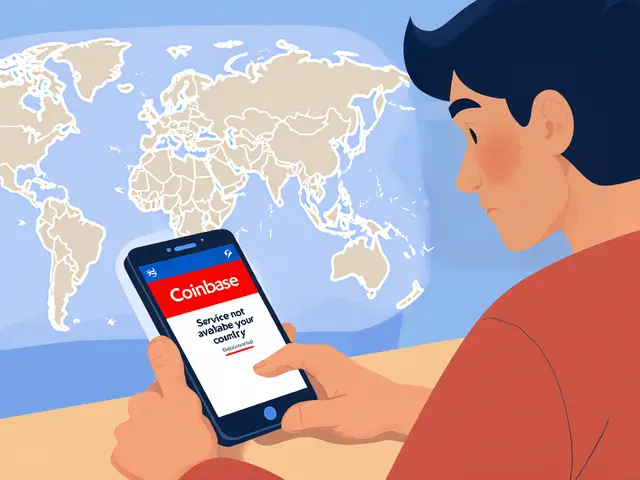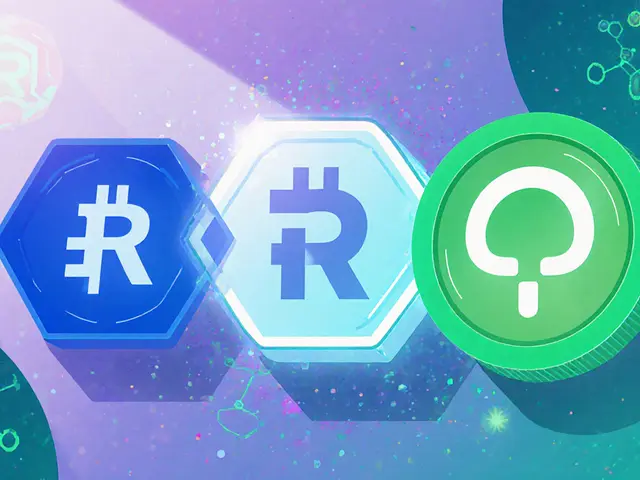When the Central Bank of Nigeria (CBN) ordered banks to stop any crypto‑related activity in February 2021, most expected the market to shrink. Instead, a sprawling underground network sprang up, powered by peer‑to‑peer (P2P) traders, mobile apps, and community‑run escrow services. This article unpacks how that hidden economy grew, what tools kept it alive, and why it still matters three years later.
What the ban actually covered
Underground crypto economy is a informal, peer‑to‑peer trading ecosystem that operates outside formal banking channels. The CBN circular of 5 February 2021 didn’t outlaw owning or trading crypto for individuals; it simply forbade banks from facilitating any crypto transaction. That nuance created a legal gray area where users could still buy, sell, and hold digital assets, but only through non‑bank channels.
How the underground market formed
- **P2P platforms exploded** - Binance P2P became the go‑to gateway, amassing over 1.2 million Nigerian users by Q3 2022 and processing roughly $150 million in monthly naira‑denominated trades.
- **Messaging apps became verification hubs** - 78 % of traders used WhatsApp groups to confirm payments, while 63 % relied on Telegram channels for price discovery (Breet.io, 2022).
- **Escrow services moved to decentralized apps** - Multi‑signature escrow contracts on platforms like Paxful handled 32 % of the global escrow volume from Nigeria during the ban (Techpoint Africa, Jun 2022).
These three pillars - a trusted P2P exchange, real‑time chat verification, and decentralized escrow - formed a self‑sufficient financial layer that bypassed banks entirely.
Key platforms and tools
| Platform | Monthly Trade Volume (2022) | Escrow Model | Average Transaction Size |
|---|---|---|---|
| Binance P2P | $150 million | Custodial escrow (platform‑held) | ₦200,000‑₦500,000 |
| Paxful | $45 million | Multi‑signature smart‑contract | ₦100,000‑₦400,000 |
| Quidax (P2P module) | $30 million | Hybrid (platform + user‑managed) | ₦250,000‑₦600,000 |
All three platforms required users to verify identity through phone numbers and social profiles, but none asked for bank‑linked KYC, keeping the network out of the formal AML net.

Risk mitigation and community trust
Without a regulated clearinghouse, traders invented their own safeguards:
- Reputation scores - Every platform displayed seller ratings and completed‑trade counts; high‑scoring accounts attracted the most volume.
- Blacklists shared across WhatsApp groups - Communities of 50,000+ members circulated lists of known scammers, cutting repeat fraud by roughly 37 % (CryptoNaija, Sep 2022).
- Test‑trade protocol - Before a large transfer, both parties would exchange a small amount (often ₦5,000) to confirm payment pathways.
Even with these measures, the underground economy was not immune to scams. Monierate’s 2022 study found 42 % of traders had experienced at least one fraud attempt, and 67 % reported frozen bank accounts after receiving crypto payments through informal channels.
Economic scale and impact
Chainalysis reported $56.7 billion in Nigerian crypto transactions between July 2021 and June 2022 - 1.2 % of global crypto flow despite Nigeria representing only 0.1 % of world GDP. The underground market accounted for 85 % of that activity, with monthly volumes peaking at $18.3 billion in 2022 alone (NESG, 2023).
Demographically, 68 % of participants were aged 18‑35; students (41 %) and small‑business owners (29 %) drove most trades. The market’s quick liquidity helped fund university fees, import‑related payments, and everyday expenses that banks refused to process.
User experiences - success and loss
Reddit’s r/NigeriaCrypto exploded from 3,200 members in early 2021 to over 87,500 by late 2022. One user, “LagosTrader87”, recounted turning a ₦5,000 seed fund into a ₦2.3 million portfolio solely via Binance P2P, financing his degree in the process. Conversely, “AbujaInvestor” lost ₦380,000 after a seller vanished post‑payment, highlighting the absence of legal recourse.
Trustpilot reviews of Binance P2P averaged 4.2 / 5 stars, praising deep ₦/BTC liquidity but noting frequent payment delays caused by banks still flagging incoming transfers.
Future outlook - from underground to regulated
When the CBN lifted the ban in December 2023, it kept a strict ban on banks holding crypto assets, while allowing licensed exchanges limited naira‑denominated accounts. Yet a May 2024 SEC announcement aimed to ban all P2P naira trading, showing regulators remain uneasy with the model that proved most resilient.
Upcoming legislation - the Investments and Securities Act of March 2025 - will treat many digital assets as securities, subjecting them to formal reporting. A 25 % tax on crypto profits slated for 2026 could push a portion of activity back underground, repeating the cycle.
Experts agree the Nigerian case illustrates a broader truth: outright bans often accelerate adoption, forcing regulators to eventually accommodate hybrid ecosystems. The underground infrastructure built during 2021‑2023 - from escrow smart contracts to community arbitration groups - will likely feed into any future formal framework.
Key takeaways for anyone eyeing similar markets
- Legal gray zones can spark massive informal finance networks.
- Trust is built through transparent reputation systems and community‑driven blacklists.
- Escrow technology, even when simple, reduces fraud dramatically.
- Regulators should anticipate that bans may increase, not decrease, transaction volume.
- Hybrid models that blend formal licensing with community verification may be the long‑term solution.
Why did crypto usage rise after the CBN ban?
The ban cut off bank channels, forcing users to seek alternatives. P2P platforms offered instant liquidity, while messaging apps provided a familiar way to verify trades. The combination created a fast, community‑driven market that filled the void.
Which P2P platform dominated the underground market?
Binance P2P led the pack, reaching over 1.2 million users and handling about $150 million each month in 2022. Paxful and Quidax followed, but none matched Binance’s volume or user base.
What were the main risks for traders?
Scams (42 % reported at least one), frozen bank accounts after crypto‑linked transfers (67 % experienced this), and lack of legal recourse for disputes were the top concerns.
How did the underground market affect Nigeria’s economy?
It moved roughly $18 billion through informal channels in 2022, representing about 3 % of the country’s informal economy and cementing Nigeria’s position as the second‑largest crypto adopter in Africa.
What’s the outlook after the 2023 ban reversal?
Regulators are still wary of P2P trading, as shown by the 2024 SEC proposal to ban naira‑based P2P. Future laws will likely blend formal licensing with the community tools that kept the market alive, but taxes and tighter KYC could drive some activity back underground.




Comments (10)